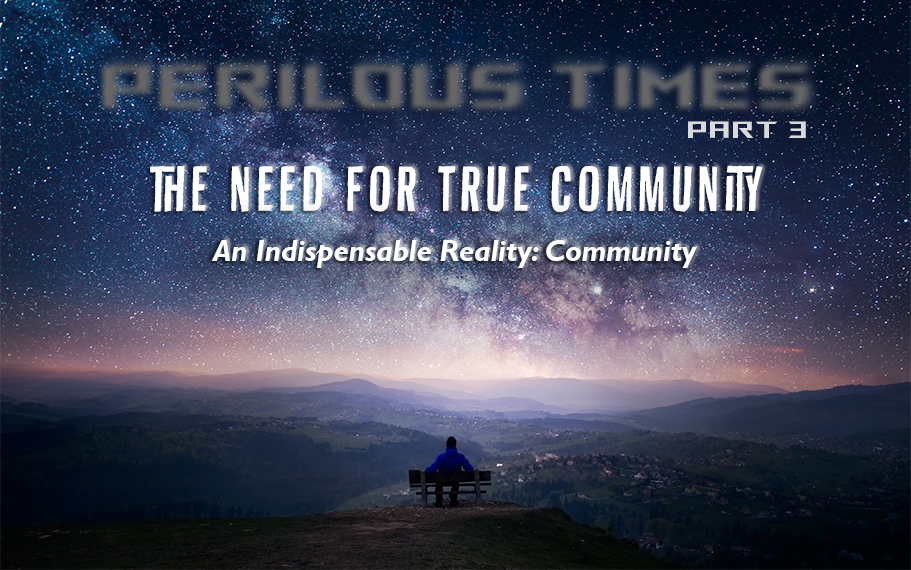In the previous blog, I described the first of four things we must know in order to navigate properly through the peril of the last days. These things have always been critical for Christian living, but it seems as if the Holy Spirit is underlining them these days. The first is the sovereignty of God. Nothing can replace our ability to trust God as the One who is in control of all things. We saw in the last blog the practical benefits of knowing that God, through his Son, “upholds all things by the word of his power” (Hebrews 1:3).
The second thing that is indispensable to surviving in perilous times is community. By this, I mean the necessity of partaking and active participation within the body of Christ. Perhaps the best way to understand the vitality of the early church is by reading Luke’s description in Acts. This is the first community that emerged as a result of Gospel preaching:
“And they devoted themselves to the apostles’ teaching and the fellowship, to the breaking
of bread, and the prayers. And awe4came upon every soul and many wonders and signs
were being done through the apostles. And all who believed were together and had all
things in common. And they were selling their possessions and belongings and distributing
the proceeds to all, as any had need And day by day, attending the temple together and
breaking bread in their homes, they received their food with glad and generous hearts,
praising God and having favor with all the people. And the Lord added to their number
day by day those who were being saved.” Acts 2:42-47
The fruit of the outpouring of the Spirit was the emergence of a community built on Gospel truth, transparency, and accountability. Today, especially among those claiming to have the fullness of the Spirit, we rarely find such community. I remember first reading about the early church described in Acts as a new believer. I entered church life expecting to find this kind of community. I was disappointed when I found instead a sort of cozy, casual Pentecostal club!
There seems to be what has often been referred to as a ‘conspiracy of casualty’ among believers today. The unspoken rule seems to be that I won’t ask you any uncomfortable questions as long as you promise not to ask me any. But that is a far cry from what Luke records regarding the transparency and accountability that characterized that first community. Let’s take a deeper description of the elements that made up that community:
• Apostle’s teaching: Jesus had chosen the twelve to be a repository of his Gospel. On the Day of Pentecost, Peter stood and preached the Gospel clearly. Much of the apostle’s teaching consisted of illuminating the Hebrew Bible (the Old Testament) as to the Messianic promises. The resurrected Jesus Himself had familiarized the apostles in the Upper Room with this Messianic interpretation of the Hebrew Scriptures. There are no longer any (canonical) apostles today, but we have their teaching contained in the New Testament.
• Fellowship: The English word fellowship is one of several terms used in the English Bible. It is too rich a word to be translated by one English word. It is translated by the words fellowship, participation, society, sharing, partaking, etc., It has its origins in the Godhead, describing the relationship between the members of the Trinity. The Son, in fellowship with the Father and Spirit, came down from the Godhead and entered our domain in order to make a life of fellowship between God and man possible. As the apostle Joy said it so succinctly:
“That which was from the beginning, which we have heard, which we’ve seen with our eyes,
we looked upon and have touched with our hands, concerning the word of life—the life was
made manifest, and we have seen it, and testify to it and proclaim to you the eternal life, which
was with the Father and was made manifest to us—that which we have seen and heard we
proclaim also to you, so that you too may have fellowship with us; and indeed our fellowship
is with the Father and with His Son Jesus Christ.” I John 1:1-3
• Breaking of bread: There are two possible references here; in fact, a case can be made for them to be joined together. First is a general statement that they ate their meals together. Indeed, Luke repeats that in this paragraph, referencing they regularly ate together (Acts 2:46). Christianity makes eating together a sacrament. But there is no doubt that this is also a reference to the Lord’s Table, that is a common meal centered upon the bread and the cup. Elsewhere in Acts, the breaking of bread refers to eating the Lord’s Supper together (Acts 20:7). It is important to realize that the Lord’s Supper is not just the bread and the cup but a full meal in which the focus is upon the bread and the cup. Paul chides the Corinthians for eating the meal because they were hungry and refusing to wait upon the others (he didn’t mean they were eating the wafer before the others arrived).
• prayers: Undoubtedly, the plural form references the Jewish temple prayers that the apostles observed (see Acts 3:1). Without this heavenly focus, the Jerusalem church would not have exhibited the power it did. So many who focus on community today fail to have the spirit of prayer of the Jerusalem community. Luke is careful throughout Acts to describe the prayerfulness of the early church (Acts 1:14, 2:42, 13:2).
Luke also supplies a statement describing the continued growth of that first church: “And the Lord added to their number day by day those who were being saved” (Acts 2:47). This was far from the typical communities we often see today that are ingrown and self-centered. This community saw continued fruit through Gospel preaching in transformed lives added to the community. This also differs from what is often the norm today of people accepting Jesus into their hearts yet never being added to the community.



0 Comments